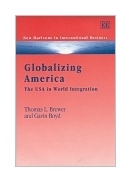|
||
• wydawnictwa polskie
• Zamów informacje o nowościach z wybranego tematu • kontakt
• Cookies na stronie |
GLOBALIZING AMERICA THE USA IN WORLD INTEGRATIONBREWER T., BOYD G.wydawnictwo: EE , rok wydania 2000, wydanie Icena netto: Globalization America The USA in World Integration Introduction Thomas L. Brewer and Gavin Boyd The term 'globalization' has taken on diverse meanings in the empirical social science literature as well as a variety of connotations in more evaluative semi-popular books and articles. In this volume, each author has been granted the liberty of adopting his or her own preferred notion - either explicitly or implicitly. However, for the most part, the concepts that are evident in the individual chapters fall into one or more of the following elements of the concept. A relatively comprehensive concept of globalization is that it is a process involving three spheres - economic, political and cultural. Within the economic sphere, there are both quantitative and qualitative aspects to each of two dimensions at the macro level. One dimension concerns the countries that are involved in international economic relationships - in which the quantitative aspect is the number of countries and the qualitative aspect is the diversity of the countries. This dimension is the geographic dimension. The second includes the economic relationships among countries - in which the quantitative aspect is the number of interactions among countries and the qualitative aspect is the variety of the interactions. At the macro level, there are thus four sets of indicators, with both quantitative and qualitative aspects for each of the two dimensions: number and diversity of countries for the geographic dimension; volume and variety of interactions for the relationship dimension. As parallels to these macro-level dimensions, there are micro-level dimensions concerning corporations' strategies and operations. Indeed, many of the macro-level aspects of economic globalization are aggregations of corporate-level international interactions - in terms of the quantity and diversity of their interactions as well as the number and diversity of the countries involved. Thus, a corporation that is headquartered in one country with foreign affiliates and other business interests in most countries and in all regions of the world and that has an enormous volume of transactions of many types among them every day can be reasonably called a 'global' corporation. Contents 1 Intel-nationalization and globalization of the American economy Frederic L. Pryor 2 Deepening integration and global governance: America as a globalized partner John Kirton 3 The USA in the world trading system Sven Amdt 4 A public choice perspective on the globalizing of America Willem Thorbecke 5 The globalization of US industries Mono Makhija and Sandra Williamson 6 Technology in the globalization of the USA Maria Papadakis 7 The United States and global capital markets Joseph P. Daniels 8 American corporate plannmg and international economic disputes Thomas L. Brewer and Stephen Young 9 American macromanagement issues and policy Joseph P. Daniels and John B. Davis 10 Regional trade agreements Ronald J. Wonnacott 11 Structural statecraft Gavin Boyd 12 Collective management issues in US foreign economic relations Gavin Boyd 301 pages Księgarnia nie działa. Nie odpowiadamy na pytania i nie realizujemy zamówien. Do odwolania !. |


